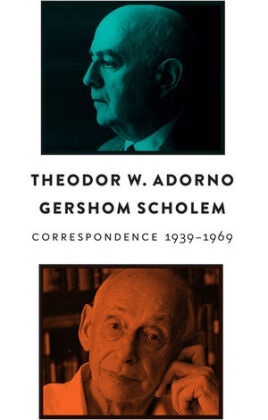Read more
Informationen zum Autor Theodor W. Adorno (1903-1969) was a philosopher, sociologist, and music theorist. A prominent member of the Frankfurt School, Adorno was one of the most influential thinkers of the twentieth century in the areas of social theory, philosophy, and aesthetics. Gershom Scholem (1897-1982) was a historian of religious ideas and a preeminent scholar of Jewish mysticism. He was the first Professor of Jewish Mysticism at the Hebrew University of Jerusalem. Klappentext At first glance, Theodor W. Adorno's critical social theory and Gershom Scholem's scholarship of Jewish mysticism could not seem farther removed from one another. To begin with, they also harbored a mutual hostility. But their first conversations in 1938 New York were the impetus for a profound intellectual friendship that lasted thirty years and produced more than 220 letters. These letters discuss the broadest range of topics in philosophy, religion, history, politics, literature, and the arts - as well as the life and the work of Adorno and Scholem's mutual friend Walter Benjamin.Unfolding with the dramatic tension of a historic novel, the correspondence tells the story of these two intellectuals who faced tragedy, destruction, and loss, but also participated in the efforts to reestablish a just and dignified society after World War II. Scholem immigrated to Palestine before the war and developed his pioneering scholarship of Jewish mysticism before and during the problematic establishment of a Jewish state. Adorno escaped Germany to England, and then to America, returning to Germany in 1949 to participate in the efforts to rebuild and democratize German society. Despite the differences in the lifepaths and worldviews of Adorno and Scholem, their letters are evidence of mutual concern for intellectual truth and hope for a more just society in the wake of historical disaster.The letters reveal for the first time the close philosophical proximity between Adorno's critical theory and Scholem's scholarship of mysticism and messianism. Their correspondence touches on questions of reason and myth, progress and regression, heresy and authority, and the social dimensions of redemption. Above all, their dialogue sheds light on the power of critical, materialistic analysis of history to bring about social change and prevent repetition of the disasters of the past. Zusammenfassung At first glance, Theodor W. Adorno's critical social theory and Gershom Scholem's scholarship of Jewish mysticism could not seem farther removed from one another. To begin with, they also harbored a mutual hostility. But their first conversations in 1938 New York were the impetus for a profound intellectual friendship that lasted thirty years and produced more than 220 letters. These letters discuss the broadest range of topics in philosophy, religion, history, politics, literature, and the arts - as well as the life and the work of Adorno and Scholem's mutual friend Walter Benjamin.Unfolding with the dramatic tension of a historic novel, the correspondence tells the story of these two intellectuals who faced tragedy, destruction, and loss, but also participated in the efforts to reestablish a just and dignified society after World War II. Scholem immigrated to Palestine before the war and developed his pioneering scholarship of Jewish mysticism before and during the problematic establishment of a Jewish state. Adorno escaped Germany to England, and then to America, returning to Germany in 1949 to participate in the efforts to rebuild and democratize German society. Despite the differences in the lifepaths and worldviews of Adorno and Scholem, their letters are evidence of mutual concern for intellectual truth and hope for a more just society in the wake of historical disaster.The letters reveal for the first time the close philosophical proximity between Adorno's critical theory and Scholem's scholarship of m...
Report
"The correspondence between Theodor Adorno and Gershom Scholem reveals an intriguing friendship and one of the most important philosophical genealogies of the twentieth century. The relation between critical theory and Jewish mysticism comes to life in their exchange, clarifying how these mammoth intellectuals illuminated each other's scholarship. Asaf Angermann's Introduction to the volume is brilliant and insightful."
Susannah Heschel, Dartmouth College
"Gershom Scholem and Theodor Adorno were an odd couple: the first a Zionist and scholar of Kabbalah, the second a neo-Marxist philosopher who returned to Germany after the war. Yet their surprising thirty-year friendship, wonderfully expressed in this correspondence, reveals the broad horizons of these two towering intellectuals of the twentieth century."
David Biale, University of California - Davis
"Brought together by their mutual regard for Walter Benjamin and shared grief at his death, Gershom Scholem and Theodor Adorno began an unlikely, yet increasingly intense epistolary friendship. Scrupulously annotated and masterfully introduced by Asaf Angermann, their letters open a window letting in the twilight glow of a once vibrant German-Jewish culture before its passing into history."
Martin Jay, University of California - Berkeley
"The friendship between Theodor Adorno and Gershom Scholem was as fascinating as it was improbable. Dialectics came into explosive contact with the history of mysticism, sending sparks of light in a thousand directions. Their correspondence, now available in English with a superb editorial apparatus, ranks as one of the most exhilarating documents in the entire history of twentieth-century thought."
Peter Gordon, Harvard University
"Theodor Adorno said of Walter Benjamin's correspondence: 'The level and quality of letters is always also determined by its addressee.' The quality of the Adorno-Scholem correspondence, intelligently introduced by Asaf Angermann and elegantly translated by Sebastian Truskolaski and Paula Schwebel (with assistance from Stepahie Graf), is correspondingly high. It's well worth lifting our eyes to see it."
Jewish Review of Books

